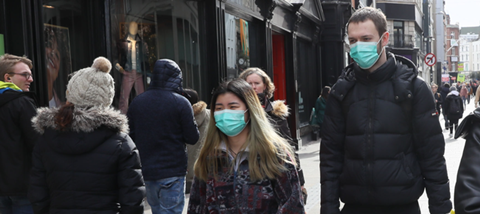
We have become a nation of furtive hand-washers. Suddenly, casually wiping our lips or touching the corner of an eye is followed by the alarming thought…“when did I last wash my hands?”
Not for the first time we find that our daily news is dominated by a single topic that will run for months on end, only this time it’s not Brexit, it’s a virus. As the numbers ramp up and the daily bulletins intensify there is a sense of anxiety among many.
As usual, our media is obsessed with news close to home, and more serious events further away get forgotten. But Yemen is still on the brink of man-made starvation; families in Idlib Syria are still desperate to escape a conflict so cruel that even local hospitals have become fair game, and large parts of East Africa are still under attack from a plague of billions of locusts. In fact a plague of locusts in Pakistan has recently caused the government there to declare a national emergency. Makes you think: if running out of toilet paper is the worst thing that can happen to us this week – then we are pretty darn lucky.
Here's three things we all need to remember at this point:
1. We are living in the end times
Before you accuse me of over reacting, I should say we have actually been in the end times, (last days) since Christ’s resurrection 2,000 years ago! Theologically speaking, the last days began with that event and continue until Christ’s return. So paradoxically we are living in the last days, but we're probably not living in the last week.
More importantly, instead of joining the “Armageddon out of here” folk in our churches who like to fixate on world events and precise timings, I think there are more helpful ways to view what’s happening.
We sometimes reduce the Gospel to the idea that Jesus died for our sins and now we’re waiting for him to come back, end of story. But it’s important to remember that Jesus didn’t just die for our sins, and it’s not just about waiting for his return. Jesus’ life gives us clues about how we are to live now, especially in troubling times.
Christ-centered living in difficult times is not about escaping the world’s problems by retreating into the safety of our churches and disconnecting from the bad world out there. It’s about embracing the struggles in life and seeing our fear and anxiety in context.
2. It’s normal to sometimes feel afraid
It is sometimes said that the phrase “do not be afraid” occurs in the Bible 365 times – one reference for each day of the year. It's a nice theory, but it has been debunked. However many times the Bible says “don’t be afraid”, it’s not 365. But nevertheless this statement occurs in different forms very frequently in scripture. Jesus in John 14:1 says: "Do not let your hearts be troubled – believe in God, believe also in me”.
When God says “don’t be afraid” he invariably follows it up with the reason why we shouldn’t be afraid (highlighted in bold below). So it’s not just a “come on pull yourself together”, but a genuine encouragement:
- “Do not be anxious about anything, but….bring your requests to God, and the peace of God which passes understanding will guard your heart and mind.” (Philippians 4:6-7)
- “Do not be dismayed, for I am your God. I will strengthen you and help you; I will uphold you with my righteous right hand.” (Isaiah 41:10)
- “Do not be afraid for I have redeemed you. I have called you by your name and you belong to me. (Isaiah 43:1)
- “Do not worry about tomorrow, for tomorrow will worry about itself. Each day has enough trouble of its own” (Matthew 6:34)
God wants to reassure us that our fears and anxieties, although part of being human, are not the thing that needs to drive us. Because...
3. Our hope does not depend on our well-being
As Christians, we should not place our hope in a trouble-free life, but in God’s ability to hold us whatever troubles befall us.
It won't have escaped your attention that bad things happen to Christians as well. Sometimes, it’s tempting to think that God will protect me from the worst tragedies in life such as serious illness or accident. Somehow, so long as I am faithful in prayer, serious in following Jesus, and generous in giving, he will not let the worst disasters of life happen to me.
But road traffic accidents, relationship break-ups and cancer all happen to Christians as well. An arrangement where we follow Jesus and really bad things will never happen doesn’t exist. Instead, our security, our hope, comes from being known to God. The promise is that God will hold on to you whatever life throws at you. The promise is that there will come a point when this age comes to an end with all its difficulties and traumas. And at that point, the promise is that God will still be holding on to you – no matter if you have lost your grip on him. This is the Christian hope.
In the aftermath of 9/11, Ravi Zacharias came up with a phrase that has been quoted many times since. He spoke of “steadying the soul when the heart is under pressure”. This is what we are called to do at times like this where there is fear, hype and unbalanced news.
In case you want to do something more, something that will bring hope to yourself and someone else in troubling times, you could do much worse than visiting the website of Tearfund or Christian Aid and making a donation toward an immediate catastrophe. It will give you context, and may help put your anxiety into perspective.
































